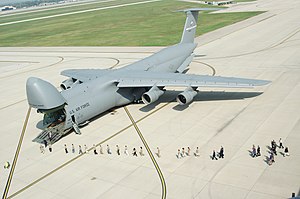
Back جسر جوي Arabic گوێزەرەوەی ئاسمانی CKB Luftverlastung German Αερομεταφορά Greek Puente aéreo Spanish ترابری هوایی Persian תובלה אווירית HE Pengangkutan udara ID Angkut udara Malay Transporte aéreo tático Portuguese

An airlift is the organized delivery of supplies or personnel primarily via military transport aircraft.
| Part of a series on |
| War (outline) |
|---|
 |
Airlifting consists of two distinct types: strategic and tactical. Typically, strategic airlifting involves moving material long distances (such as across or off the continent or theater), whereas a tactical airlift focuses on deploying resources and material into a specific location with high precision.
Depending on the situation, airlifted supplies can be delivered by a variety of means. When the destination and surrounding airspace is considered secure, the aircraft will land at an appropriate airport or airbase to have its cargo unloaded on the ground. When landing the craft or distributing the supplies to a certain area from a landing zone by surface transportation is not an option, the cargo aircraft can drop them in mid-flight using parachutes attached to the supply containers in question. When there is a broad area available where the intended receivers have control without fear of the enemy interfering with the collection and/or stealing the goods, the planes can maintain a normal flight altitude and simply airdrop the supplies down and let them parachute to the ground. However, when the area is too small for this method, as with an isolated base, and/or is too dangerous to land in, a Low-altitude parachute-extraction system drop is used.
During disasters and other crises, airlifts are used to support or replace other transport methods to relieve beleaguered civilian populations. Examples include the Berlin Airlift, to supply isolated West Berlin with food and coal, the 1990 Air India airlift to rescue Indian citizens caught up in the Gulf War, and the 1967–70 Biafran airlift during the Nigerian Civil War.